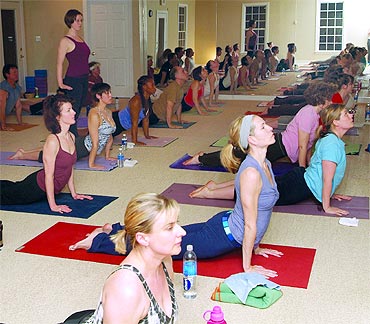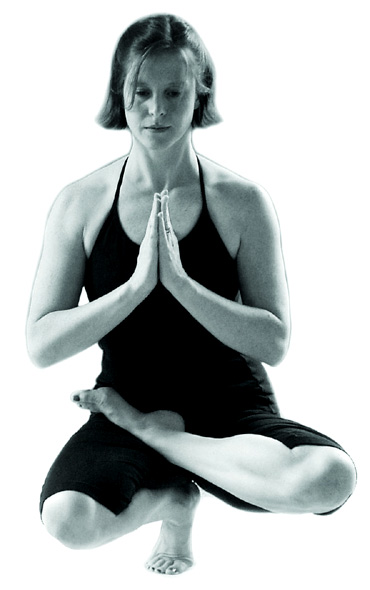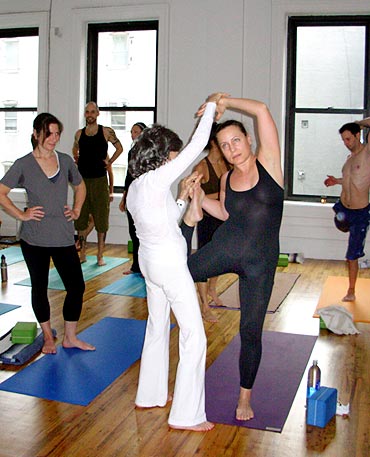 | « Back to article | Print this article |
'Yoga does not belong to any religion'
Yoga is a spiritual practice of self-improvement and bringing an individual closer to God, instructor Becky Crigger tells Arthur J Pais
Becky Crigger, mother of two young girls, goes to her Episcopalian church in Blacksburg, Virginia regularly. She also practices yoga every day, starting with Om and other chants she knows are deeply connected with Hinduism. Her children know a few yoga postures too, she says. Her husband of nine years knows what yoga is, but may follow her some day, she adds, chuckling.
"I don't see any contradiction between yoga and my Christianity," she says, echoing the thoughts of Huston Smith, one of the most respected of religious writers in America (Why Religion Matters), who has been practicing yoga for over six decades. He also does namaaz several times a day and worships at a liberal church on Sundays near his home in Berkeley, California.
"The times in church when I have felt the most moved by joy in God have been after a period of deep yoga practice," Crigger asserts. "I love all religions. I have studied Buddhism and Hinduism in depth, and while there are many important differences between religions, I do not consider any of them to be 'wrong'. In the deepest understanding of God, we are all united."
 |
"What is the fuss over Hinduism and yoga," asks Crigger, who runs In Balance Yoga studio and has taught yoga in cities in Virginia, North and South Carolina and Tennessee.
"You cannot deny it has come from Hinduism. And what is wrong in acknowledging that? Hinduism is a beautiful religion. Hinduism is one of the world's oldest religions and yoga is the world's oldest spiritual practice. So, of course, yoga is associated with Hinduism. But that does not mean that yoga belongs exclusively to Hinduism. It does not belong to any religion, but rather enhances any belief system by bringing the practitioner closer to his or her beliefs," she says.
'Balance the spiritual aspects of yoga with the physical'
Crigger, who teaches a variety of yoga exercises including hot yoga, vinyasa yoga and prenatal yoga, has never been to India. But she is guided by -- among several people who she says deeply know Indian philosophy, Hindu religion and traditions -- Graham Schweig. He is associated with the Hare Krishna movement and noted for his translation of the Bhagvad Gita. He is also an instructor at her yoga studio.
Raised in an Episcopalian family, Crigger, who has taught middle and high school English and language arts, has a master's in education from Vanderbilt University in Nashville, Tennessee. She has minored in religious studies and at one point considered divinity school.
A trained dancer in the Western canon, she says she explores "the energy of dance and rhythm" in her yoga practice, particularly when teaching in the vinyasa style.
 |
"I have recognised for many years the importance of balancing the spiritual aspects of yoga with the physical," she says, speaking softly with a southern accent. "My classes are vigorous and challenging but at the same time they offer an element of surrender and letting go."
'Yoga is a spiritual practice of self-improvement'
Her first yoga teacher was Jimmy Barkan in Fort Lauderdale, Florida, who is inspired by Bikram Yoga. Crigger has been teaching yoga for over eight years.
"Many of my students take yoga classes to improve their physical condition," she says. "But to those who want to go into the meditative aspects, I offer a lot of encouragement, and share with them my own experiences and how meditation and yoga have helped me, especially when I was a beginner about a decade ago."
She says people who condemn yoga because of its association with Hinduism, do so because of fear of the unknown.
 |
"There is a lot of talk about yoga's Hindu roots and 'false gods' as well as meditation 'emptying the mind' to potentially let in bad spirits," she muses. "I believe yoga is a spiritual practice of self-improvement -- the world's oldest psychology -- and bringing an individual closer to God."
'Yoga teaches you to let go'
Meditation is not about "emptying the mind. That is a misunderstanding," she asserts.
Meditation, she continues, "is about quieting the mind, slowing down the thoughts, bringing the attention deeper into the self so that we may find communion with God. Prayer in church, hymns, moving onto your knees -- all of these are forms of meditation, really. Ishvara pranidhana -- Sanskrit for devotion or surrender to God -- is ultimately what we practice, not the worship of the physical body. It is the letting go of our attachment to the physical body that is our highest practice. But first, we must tune into that body and feel its presence before we can move beyond it. One must fully understand something before he or she can move beyond. For example, in times of mourning we cannot fully move beyond our sadness until we allow ourselves to fully experience the emotion."
In her personal life, especially while waiting for the birth of her children, yoga gave her the strength to reduce her anxiety and feel like a wholesome person. Anxiety had become a major obstacle in her life over a decade ago, she admits.
 |
"I used to get panic attacks often," she says. But after two weeks of yoga, she could feel calm energy flowing through her.
"One of the people who comes to my yoga studio is a high-profile attorney, a very successful woman," she says. "But she was also extremely tense. She started with yoga, and then went into meditation. Today, she knows, like I have known for years, that yoga teaches you to let go. It also lets you know that every obstacle in life is there for a reason."



